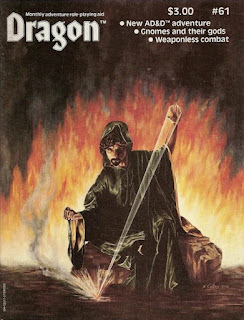The Articles of Dragon: "Call of Cthulhu is a Challenge"
 "Dragon's Augury" was the name given to Dragon magazine's recurring review section. At the time I first encountered it, "Dragon's Augury" had no single, dedicated reviewer. A different contributor reviewed each featured gaming product, though there were often contributors whose names I'd see quite regularly, such as Tony Watson and Ken Rolston.
"Dragon's Augury" was the name given to Dragon magazine's recurring review section. At the time I first encountered it, "Dragon's Augury" had no single, dedicated reviewer. A different contributor reviewed each featured gaming product, though there were often contributors whose names I'd see quite regularly, such as Tony Watson and Ken Rolston. Sometimes, though, there'd be a review from a notable figure within TSR, like Gary Gygax, and these naturally caught my attention. A good example of this occurred in issue #61 (May 1982), in which David Cook, author of one of my favorite AD&D modules, wrote a review of the newly released Chaosium RPG, Call of Cthulhu. By the time this review appeared, I already owned a copy and was a great fan of it. Nevertheless, I was very curious to hear what Cook might have to say about it.
Though Cook had a lot of positive things to say about Call of Cthulhu, the overall tenor of his review could probably be called "mixed." After providing a nice overview of both the works of H.P. Lovecraft and the intended playstyle of CoC, he launches into his dissection of the game's flaws. For example, he points out that, while short, Basic Role-Playing, is not very complete, with many ambiguous rules. The same is true of the Call of Cthulhu rulebook itself, which, in addition to ambiguity, includes editorial errors that further contribute to its lack of clarity. In particular, Cook notes that the game's combat system lacks, among other things, "rules for how to deal with cover, movement, surprise, or other situations" that might come up in a fight.
Cook singles out A Sourcebook for the 1920's as "the weakest part" of the boxed set. Its contents, he believes, appear to be little more than "notes and unfinished design work." He finds the alternate character generation rules – one of my favorite parts of the book – to be "inadequately explained" and a source of confusion. Another bone of contention is the game's lack of rules for generating and handling human NPCs, whom Cook imagines will play important roles in any Lovecraft-inspired adventure. Speaking of which, Cook speaks highly of the sample scenarios included in the rulebook.
The review is fairly lengthy and detailed, but it generally goes on in this direction. I get the impression that Cook, as a fan of Lovecraft, may have had high, or at least very specific, hopes for what Call of Cthulhu should have been like and those hopes were not fully met. Even so, he acknowledges that "when played, it's fun." He does caution that, because of its rules gaps, it demands a lot of the referee. Consequently, Call of Cthulhu "is a good game for experienced role-playing gamers and ambitious judges, especially if they like Lovecraft's type of story."
As I mentioned, I already owned a copy of Call of Cthulhu by the time I read this review and was slightly baffled by it. My friends and I had been enjoying it without noticing any of the problems Cook pointed out in his review. That's probably because, as young people – I would have been twelve at the time – our grasp of the rules as written was not always the best and so we frequently made things up when we needed to do so. By contrast, Cook was already an accomplished game designer with a lot of experience both as a writer and a player of both wargames and RPGs. This undoubtedly colored the way he wrote his review, something I didn't appreciate at the time.
I also couldn't fathom why Cook had so many critical things to say about the game, despite his admission that he had found Call of Cthulhu fun in play. If he enjoyed the game, I thought, why point out its flaws? For that matter, how had he even noticed them in the first place? I thought about these and other related questions for some time afterward, which is precisely why I still remember this review more than four decades later. David Cook challenged my own assumptions and blind spots. He'd dared to say critical things about a new game my friends and I had enjoyed. In retrospect, I realize I learned a lot from his approach, even if, in 1982, it made little sense to me.James Maliszewski's Blog
- James Maliszewski's profile
- 3 followers



